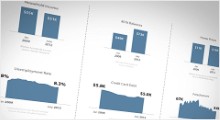
America's young people just aren't buying cars like they used to.
The share of new cars purchased by those aged 18-34 dropped 30% in the last five years, according to the car shopping web site Edmunds.com.
Some say the economy is mostly to blame -- that the young aren't buying because they've been particularly hard hit by the recession.
But others say the trend could be part of larger social shifts.
One reason is demographic: The re-urbanization of America is giving more people access to public transportation. The advent of Zipcar (ZIP) and other car-on-demand businesses is eliminating the need to own and insure an expensive vehicle that often isn't driven much.
But mostly it's the explosion of social media. Car ownership just may not be as socially important as it used to be.
"What we used to do in cars, young people are now doing online," said one analyst at a recent oil conference.
The ability to meet and interact with people on the Internet is largely replacing the need to hop in a car and cruise down the strip.
Couple that with more recent restrictions on driving -- later ages for licenses, limits on how many people can be in the car, restrictions on cell phone use -- and the Internet may be surpassing the automobile in the category that gave cars so much appeal: freedom.
"When I got into a vehicle, it represented me going to meet my friends," said Craig Giffi, automotive practice leader at the consultancy Deloitte. "For them, it cuts them off from their friends."
This is particularly true for the youngest, most digitally-connected members of Generation Y. Forty-six percent of 18-24 year-olds would choose Internet access over owning a car, according to a recent Deloitte study.
Related: America's best-loved cars
It's a trend the car companies are noticing as well.
"With this generation, what owning a car means is completely different from previous generations," said Annalisa Bluhm, a spokeswoman for General Motors. "It was a rite of passage. Now the right of passage is a cell phone."
With the Baby Boomers, Bluhm said three-quarters had obtained early life's five big rites of passage by the time they were 30 -- buying a car, graduating from college, getting married, buying a house and having kids. Now less than 40% of the under-30 crowd has all these things.
What's more, 30% of Baby Boomers considered themselves "car enthusiasts," said Bluhm, buying showcase vehicles like the Camaro, Corvette or Jeep. Less than 15% of Gen-Yers say the same, and they're flocking to more practical models.
"They have a number of things that validate them," Bluhm said. "The car is not their first purchase."
The real question for carmakers is whether young people will return to the showroom when the economy recovers. Many say they will.
"This is purely a matter of economics," said Michelle Krebs, an analyst at Edmunds.com.
Krebs said the drop in sales share by young people is misleading, as more of them are buying used cars or simply living at home longer and using their parents' vehicles. When the economy improves, they will be back en masse.
"We don't all live in urban areas and can get by without a car," she said.

Analysts at Ford (F) seem to think so too.
Young people may defer buying cars until the economy improves or they may live out their 20s in urban areas, but at some point they will have families, move to the suburbs and need vehicles, said Erich Merkle, Ford's U.S. sales analyst.
"They might be able to hold off for a period of time," said Merkle. "But Ford takes the long-term view -- They are going to be around for a long time and they are going to purchase many, many new cars."
But as Deloitte's Giffi said, the longer these young people go without cars, the easier time they have adjusting to life without one.



